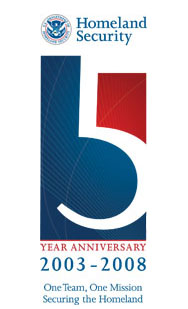Department of Homeland Security Highlights Policy Initiatives for Inclusion of People with Disabilities in Emergency Preparedness
Release Date: 09/20/04 00:00:00
For Immediate Release
Office of the Press Secretary
Contact: Press Office 202-282-8010
September 20, 2004
The first meeting of the Interagency Coordinating Council on Emergency Preparedness and Individuals with Disabilities took place today at the Department of Homeland Security. At the meeting, several senior government officials shared reports regarding significant new policy initiatives that will better integrate people with disabilities in the emergency preparedness effort.
President Bush established the Council by an Executive Order issued on July 22, 2004. The President expanded on his New Freedom Initiative, a series of policies designed to advance the interests of people with disabilities, by directing the federal government to address the safety and security needs of people with disabilities.
“All Americans, including people with disabilities and their families, can take steps to prepare themselves and their communities against the threat of terrorism and other emergencies,” said Secretary Ridge. “The energy and enthusiasm of these senior government representatives suggest that we are going to see dramatic improvements in emergency preparedness for people with disabilities.”
As a result of President Bush’s directive, a number of federal agencies have accelerated their work to better prepare people with disabilities for emergency situations. The policy initiatives announced at the Council meeting include:
- R. Alexander Acosta, Assistant Attorney General for the Civil Rights Division at the Department of Justice, announced the release of a new technical assistance document, "Making Community Emergency Preparedness and Response Programs Accessible to People with Disabilities." The document provides assistance to local officials in making emergency preparedness plans consistent with the requirements of Title II of the Americans with Disabilities Act. Mr. Acosta also reviewed the Department's work promoting emergency preparedness for people with disabilities through "Project Civic Access." Through this program, the Department has signed over 100 agreements with towns and counties across the country ensuring access to their public facilities, programs, and services, including emergency preparedness efforts.
- K. Dane Snowden, Chief of the Consumer and Governmental Affairs Bureau at the Federal Communications Commission, announced that the FCC has issued new policies and launched outreach efforts to ensure that facilities that provide Telecommunications Relay Services for persons with hearing and speech disabilities are designated priority for restoration of service in cases of emergency. In addition, he described new efforts by the FCC to improve the emergency alert system to make it more accessible for people with disabilities.
- Troy Justesen, Acting Assistant Secretary of the Office for Special Education and Rehabilitation Services, announced that the National Institute for Disability and Rehabilitation Research has committed close to $1 million to emergency preparedness research. Areas of research include the development of a Web-based software program that assists people who are deaf or hard of hearing in learning emergency preparedness skills; and a research project to improve the exit/egress of individuals with disabilities from buildings and other settings in emergencies. NIDRR will continue to expand its research in this area and will host a two day conference in October on these issues. In addition, the Rehabilitative Services Administration has awarded $1 million to the National Organization on Disability’s Emergency Preparedness Initiative to assist communities, governments and federal agencies in developing plans that will ensure the safety and security of people with disabilities in emergencies.
- W. Roy Grizzard, Assistant Secretary of Disability Employment Policy at the U.S. Department of Labor, announced the release of a report on involving employees with disabilities in emergency management planning. This comprehensive report resulted from DOL's Emergency Preparedness for People with Disabilities: An Interagency Seminar of Exchange for Federal Managers. ODEP is distributing the report to state emergency coordinators as well as public and private sector employers nationwide. In addition, ODEP is making available technical assistance on emergency planning for employees with disabilities and their employers through its Job Accommodations Network.
Daniel W. Sutherland, the Department of Homeland Security’s Officer for Civil Rights and Civil Liberties, discussed several initiatives undertaken by Homeland Security, including:
- The Office of National Capital Region Coordination, in partnership with the state and local jurisdictions within the National Capital Region and the National Organization on Disability, will host a major conference on emergency preparedness for people with disabilities. The conference will take place from September 22-24, 2004 and Secretary Ridge will be a keynote speaker.
- Ready.Gov, the Department of Homeland Security’s citizen preparedness web site, includes new and updated information to help people with disabilities prepare for and respond to emergencies of all kinds. The Council’s work will lead to the inclusion of more comprehensive guidance for people with disabilities.
- Citizen Corps will establish a National Citizen Corps Council subcommittee on emergency preparedness for people with disabilities. This subcommittee will be a key component of the federal government’s efforts to reach out to communities across the country on these issues. The subcommittee will be comprised of many leading advocates from the disability community, and will hold its first meeting in October.
###
This page was last modified on 09/20/04 00:00:00


